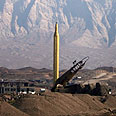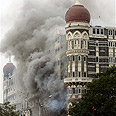

Iranian man gets 5 years in arms smuggling case
Amir Hossein Ardebili pleads guilty in plot to ship US military technology to Iran, is sentenced to five years in prison by Delaware court. Meanwhile, Two Americans convicted of providing support to terrorists sentenced to 17, 13 years each in Atlanta and prosecutors say Chicago man had knowledge of 2008 Mumbai attacks
A federal prosecutor in Delaware says an Iranian man has been sentenced to five years in prison after secretly pleading guilty in a plot to ship sensitive US military technology to Iran.
Assistant US Attorney David L. Hall says Amir Hossein Ardebili was sentenced Monday in US District Court in Wilmington.
Hall says Ardebili was arrested in the Republic of Georgia in October 2007 and extradited in January 2008 on smuggling and arms export violations.
Hall says before Ardebili's arrest the defendant acquired thousands of components for Iran, including military aircraft parts and night vision devices.
Federal officials say the case is an example of Iran's efforts to evade export controls and acquire military technology.
Meanwhile in Atlanta, a federal judge sentenced two US men convicted of providing support to terrorists to 17 and 13 years in prison on Monday for crimes that included surveying targets in Washington, DC for possible attack.
US District Court Judge William Duffey sentenced Ehsanul Sadequee of Roswell, Georgia, to 17 years in prison followed by 30 years of supervised release and Syed Ahmed of Atlanta to 13 years in prison and 30 years of supervised release.
Both men were part of a small cell based in Atlanta that spent time discussing "jihad," posted messages on Islamist militant websites and watched videos designed to build support for Islamist militant violence.
As part of the cell, they conducted video surveillance in 2005 of potential targets in Washington DC including the US Capitol building and the headquarters of the World Bank.
Sadequee, 23, went to Canada to meet other militants and also went to Bangladesh with the aim of joining a militant training camp.
Ahmed, 25, is a naturalized US citizen born in Pakistan. Both men were arrested in 2006 and convicted earlier this year in part on the evidence of Omar Kamal who cooperated with the FBI after leaving the cell.
'Chicago man knew about Mumbai attacks'
In a third terror-related case in the US, prosecutors said Monday that a Pakistani-born Chicago businessman charged with helping plan an attack on a Danish newspaper knew about the assault on Mumbai in advance and discussed other potential targets in India.
In arguing against releasing Tahawwur Rana from jail on bond, federal prosecutors in Chicago gave more details about a conversation authorities recorded earlier this year between Rana and accused conspirator David Headley.
In the September 7 conversation during a long car drive, Rana, 48, and Headley, 49, discussed Rana's meeting in Dubai days before the November 2008 attack on Mumbai with an associate referred to as "Pasha," the nickname for Abdur Rehman Hashim Syed, a retired major in the Pakistani military, prosecutors said.
Rana also asked Headley to pass his compliments on to the coordinator of the Mumbai attacks, which killed 166 people, the court filing said.
"Rana was told of the attacks before they happened and offered compliments and congratulations to those who carried them out afterwards," prosecutors said.
Travel records showed Rana, a Canadian citizen, was in Dubai days before the Mumbai attack, they said.
Headley, a U.S. citizen with Pakistani-American parentage, is accused of making five scouting trips to Mumbai on behalf of militant Pakistani groups including Lashkar-e-Taiba, which is blamed for the Mumbai assault. Headley allegedly used Rana's travel and immigration business as a cover during his trips.
Syed has been accused by US authorities of being Headley's contact with Ilyas Kashmiri, described as "one of Pakistan's most wanted terrorists and a direct link to al-Qaeda," in court documents.
Headley and Rana also discussed four other potential targets - the Danish newspaper that published cartoons offensive to Muslims in 2005; Bollywood, India's film industry; Somnath, a temple in India; and Shiv Sena, a political party with roots in Hindu nationalism.
Prosecutors said Rana later lied to investigators after he was arrested, saying his conversation with Headley was about potential business ventures.
Reuters contributed to this report















